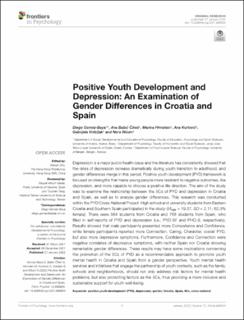| dc.description.abstract | Depression is a major public health issue and the literature has consistently showed that the rates of depression increase dramatically during youth transition to adulthood, and gender differences merge in this period. Positive youth development (PYD) framework is focused on strengths that make young people more resistant to negative outcomes, like depression, and more capable to choose a positive life direction. The aim of the study was to examine the relationship between the 5Cs of PYD and depression in Croatia and Spain, as well as to analyze gender differences. This research was conducted within the PYD Cross-National Project. High school and university students from Eastern Croatia and Southern Spain participated in the study (Mage = 19.37, SD = 2.11; 62.3% female). There were 584 students from Croatia and 768 students from Spain, who filled in self-reports of PYD and depression (i.e., PYD-SF and PHQ-9, respectively). Results showed that male participants presented more Competence and Confidence, while female participants reported more Connection, Caring, Character, overall PYD, but also more depressive symptoms. Furthermore, Confidence and Connection were negative correlates of depressive symptoms, with neither Spain nor Croatia showing remarkable gender differences. These results may have some implications concerning the promotion of the 5Cs of PYD as a recommendable approach to promote youth mental health in Croatia and Spain from a gender perspective. Youth mental health services and initiatives that engage the partnership of youth contexts, such as the family, schools and neighborhoods, should not only address risk factors for mental health problems, but also protecting factors as the 5Cs, thus providing a more inclusive and sustainable support for youth well-being. | en_US |

